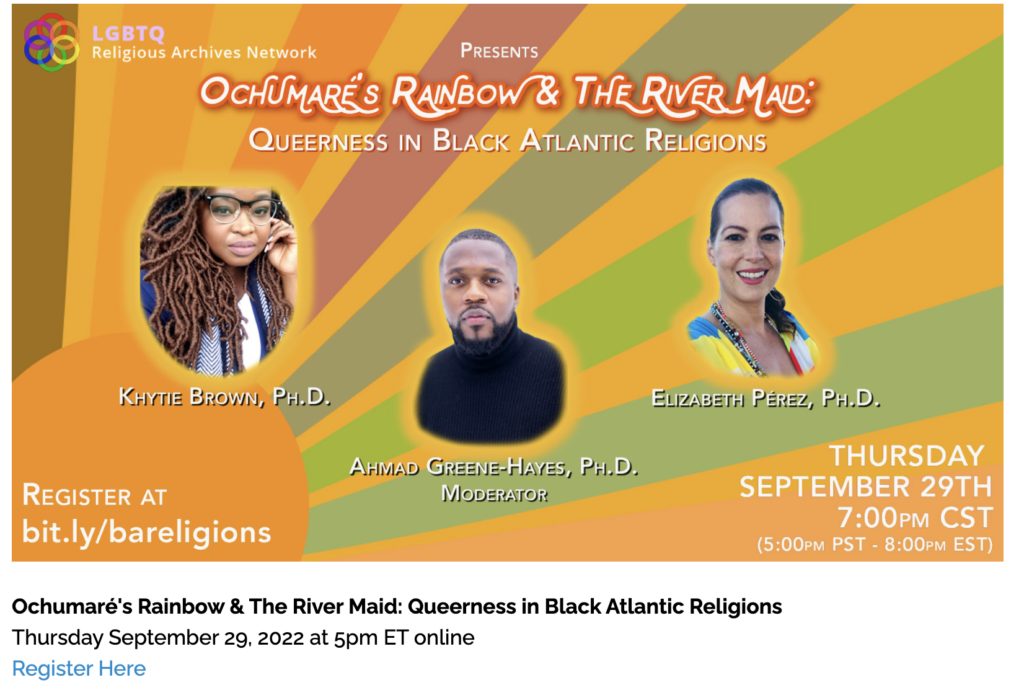By Drake Konow

“It’s best, they say, not to make trouble with River Mumma.”
On Thursday, September 29, 2022, Dr. Khytie Brown, Assistant Professor of Religious Studies, introduced an online event’s audience to River Mumma, “a vengeful mermaid who resides in the rivers of Jamaica.” Her talk was part of a webinar on Queerness in Black Atlantic Religions sponsored by the LGBTQ Religious Archives Network, an organization that preserves and encourages scholarly study of the history of LGBTQ religious movements around the world.
In her presentation, Dr. Brown described River Mumma’s role in Jamaica’s larger culture and focused specifically on understandings of the figure within Revival Zion. Brown’s current manuscript, Afro-Queer Journeys: Transnational Revival Zion Religion in Jamaica and Panama, is the first academic monograph that “foregrounds Revival Zion religion and addresses Afrophobia and homophobia.”
Within Jamaican Revival Zion religion, Brown explained, River Mumma is “an essential avatar.” River Mumma is also considered “two-fold,” a concept Brown analogized to two-spirit within some Native American traditions: “people who are neither male nor female but are gender-variant and who through spiritual intervention fill special roles as healers, shamans, and special religious leaders.” River Mumma’s two-ness is evident in various qualities: “half-fish, half-human, half-ancestor, half-primordial-spirit, mostly-female, but a lot of the times she is also non-binary.”
In addition to River Mumma’s own gender fluidity, Brown also described the connection queer practitioners of Revival Zion cultivate with River Mumma. According to a common Jamaican saying, “River Mumma inhabits the rivers of Jamaica and all the fish are River Mumma’s children.” But “who,” Brown asked, “who are the fish?” Pointing to the Jamaican use of the term “fish” as a pejorative word for homosexual men, Brown suggested that nevertheless, in Revival Zion, “the fish reigns supreme. The fish is divine, literally.”
Central to Revival Zion religion is the embodied ritual of “journey.” As Brown explained, these are spiritual journeys where practitioners operate in a trance state for hours, sometimes days or months. Practitioners travel to other lands, face spiritual battles, and belong to certain spiritual nations. The most common of these, according to Brown, are Spiritual Africa, Spiritual China, Spiritual India, and “a geospiritual locale called the River Nation.”
“It is in the River Nation,” Brown offered, “where we meet River Mumma and her children.” Brown’s ethnographic analysis suggested that homosociality was a common aspect of river rituals. Homosexual and same-gender-loving men were often prominent members of the River Nation and participants in the river rituals. Drawing on this archive, Brown’s research asks, “Within a context where it is blasphemous and often unsafe to be a little fish, how does Revival Zion Revival stand against these monstrous creatures of homophobia and Afrophobia that know how to kill little fishes? How do they sustain actual and metaphoric waters?”
Brown suggested that her work not only offers “clues for tracing a discursive relationship between Afrophobic discourses that criminalize and ostracize Africana religious practices like Revival and Christian based homophobia,” but also points to “Afroqueer epistemic orientations.” In contrast to neoliberal, secular understandings of sexual orientation tied to choice and individual will, nation-belonging chooses you. River Mumma chooses you. Being a fish is a gift from the ancestors. Dr. Brown argued that these formulations of gender and sexuality challenge larger cultural norms, neoliberal constructions, and even regnant concepts among queer and gender theorists.
In the presentation, Dr. Brown was also in conversation with Dr. Elizabeth Perez, author of Religion in the Kitchen: Cooking, Talking, and the Making of Black Atlantic Traditions, and Dr. Ahmad Greene-Hayes, Assistant Professor at Harvard Divinity School and author of a forthcoming book on religion-making in Jim Crow New Orleans.
A video of the full conversation can be seen here. More information on Dr. Khytie Brown’s research on River Mumma in Jamaican Revival Zion can be found in her 2021 article “Mermaids and Journeymen: Revival Zion and African Religious Futures,” published in Black Theology.
Drake Konow is a Religious Studies Ph.D. student concentrating on Religion in the Americas. His research focuses on the relationship between religion, capitalism, and popular culture in the U.S. and contemporary Brazil, with an emphasis on secularism, art, and critical theory.
